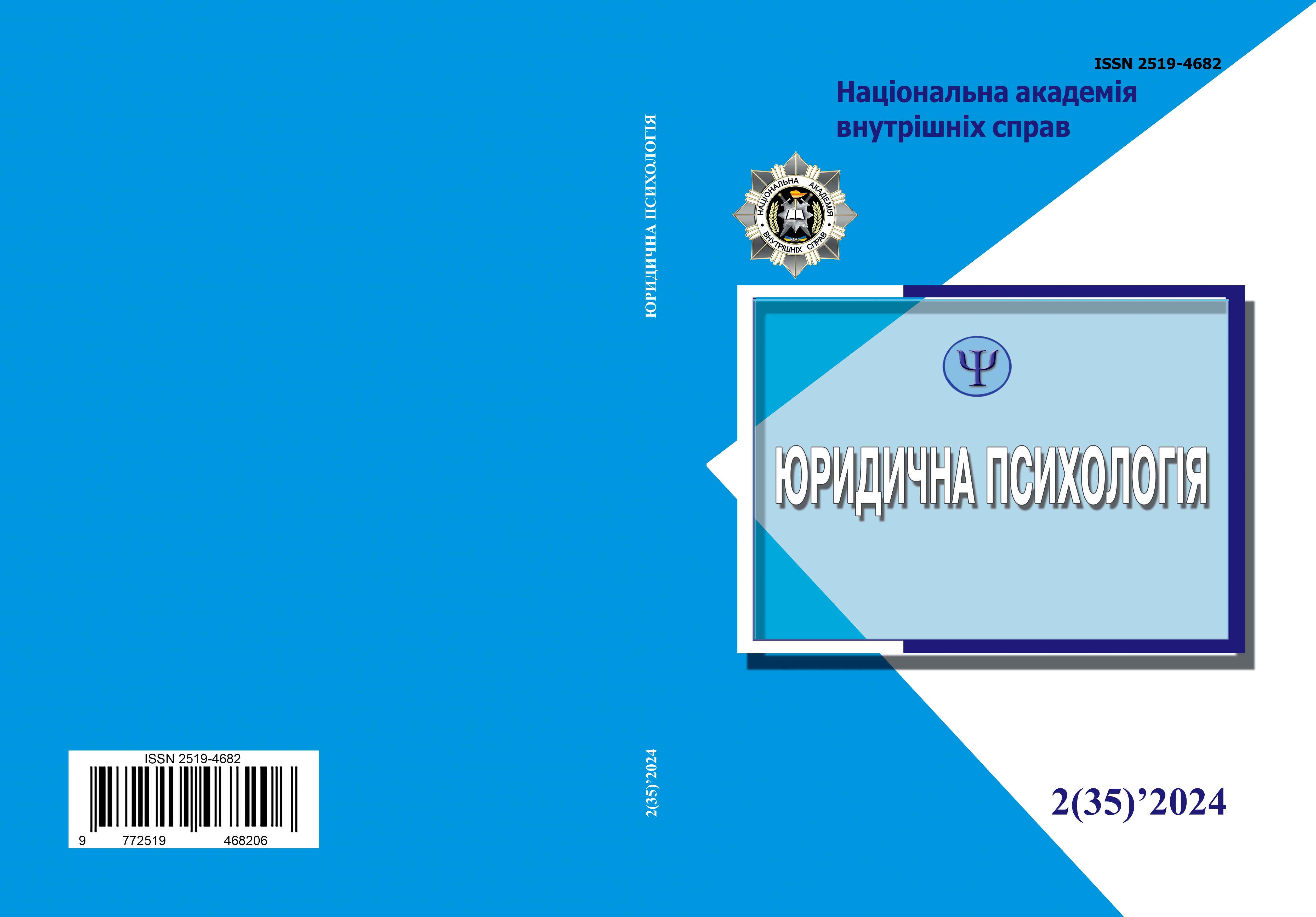Current Issues of Forming a Forensic Methodology for Investigating Corruption-Related Criminal Offenses Committed by Law Enforcement Officers
Abstract
Abstract. The formation of a forensic methodology for investigating corruption-related criminal offenses committed by law enforcement officers is an urgent and in-demand task both from the point of view of the requirements of a global democratic society and the formation of a national legal state. Currently, a comprehensive study of the formation of a forensic methodology for investigating corruption-related criminal offenses committed by law enforcement officers has not been carried out in domestic scientific literature. Accordingly, the issue requires urgent research, taking into account the conditions significantly adjusted by martial law and fundamental changes in legislation and the expansion of law enforcement practice. It has been established that the theoretical, methodological, legal, and praxeological foundations of the forensic methodology for investigating corruption-related criminal offenses committed by law enforcement officers are interconnected. The developed forensic methodology should be based on the following provisions: 1) the basis for the creation of this methodology is various types of criminal offenses from different sections of the Criminal Code of Ukraine, united by the concept of "corruption criminal offenses"; 2) the subject of forensic methodology is the regularities of not all illegal activity, but only that part of it that is associated with the commission of corruption criminal offenses by an employee of a law enforcement agency, with a specific mechanism for implementing criminal activity; 3) individual signs of corruption criminal offenses are closely interconnected in the process of proving, which determines the specifics of putting forward and verifying versions, planning an investigation, conducting individual investigative (detective) actions, operational-detective measures, etc. Taking into account the praxeological approach, the structure of the forensic methodology for investigating corruption criminal offenses committed by law enforcement officers is proposed.
Keywords: corruption; criminal proceedings; forensic characteristics; forensic recommendations; practical workers; law enforcement agency.
Downloads
References
Abakumov, O.Yu. (2023). Tactical operations as a form of algorithmization of the investigation of the acceptance of an offer, promise or receipt of an illegal benefit by an official. Scientific Bulletin of the International Humanitarian University, 65, 64-68. doi: 10.32782/2307-1745.2023.65.13.
Cherniavskyi, S.S. (2010). Financial fraud: methodological principles of investigation. Kyiv: Khai-Tek Pres.
Chornous, Yu.M., & Dulskyi, O.L. (2023). Methodological and forensic support for collecting evidence in criminal proceedings. New Ukrainian law, 4, 191-198. doi: 10.51989/NUL.2023.4.25.
Chornous, Yu.M., & Shmitko, V.V. (2023). Theoretical and methodological principles of research into the investigation of corruption criminal offenses related to obtaining unlawful benefits. Philosophical and methodological problems of law, 2(26), 61-72. doi: 10.33270/02232602.61.
Ivashchenko, S.M. (2022). Legal principles of combating corruption in the system of law enforcement agencies of Ukraine in the aspect of ensuring national security. Journal of the Kyiv University of Law, 1, 123-126. doi: 10.36695/2219-5521.1.2022.21.
Maliarova, V.O. (2005). Tactical, forensic and procedural foundations of searching for and detaining a criminal (Doctoral dissertation, Kharkiv, Ukraine).
Maliarova, V.O. (2016). Current issues of algorithmization of the investigation of certain types of crimes. Theory and practice of forensic examination and criminalistics, 16, 39-47. Retrieved from http://nbuv.gov.ua/UJRN/Tpsek_2016_16_9.
Moshnin, A. (2022). Corruption in modern Ukraine: status and directions of counteraction. Scientific works of the Interregional Academy of Personnel Management, 2(62), 106-110. doi: 10.32689/2523-4625-2022-2(62)-16.
Pchelina, O.V. (2017). Typical traces of crimes in the field of official activities. Forum Prava, 5,
-348. doi: 10.5281/zenodo.1204355.
Prokopenko, O.Yu. (2023). Peculiarities of the initiation of criminal proceedings and stages of investigation of the seizure of a representative of the authorities or a law enforcement officer as a hostage. Bulletin of the Luhansk State University of Internal Affairs named after E.O. Didorenko, 1, 299-309. doi: 10.33766/2524-0323.101.299-309.
Shatrava, S.O. (2017). Preventing corruption in the activities of the National Police as a necessary component of the state's anti-corruption policy. Forum Prava, 5, 427-434. doi: 10.5281/zenodo.206140.
Shepitko, V.Yu., & Avdieieva, H.K. (2008). Problems of algorithmization of investigative activities. Current problems of the state and law, 44, 46-50. Retrieved from http://www.apdp.in.ua/v44/09.pdf.
Shevchuk, V.M. (2020). Conceptual foundations of the formation of individual forensic methods (problems of defining the concept and features). Current problems of the state and law, 86, 246-258. doi: 10.32837/apdp.v0i86.2452.
Shevchuk, V.M. (2022). Formation and implementation of forensic methodology for investigating corruption criminal offenses. Legal scientific electronic journal, 6, 450-455. doi: 10.32782/2524-0374/2022-6/101.
Statistics on the number of registered criminal offenses, indictments submitted to the court in relevant proceedings, and other results of pre-trial investigation. (n.d.). Retrieved from https://dap.nazk.gov.ua/kpi/info/1/.
Tarkan, O.M. (2020). Situational approach in the methodology of investigation of acceptance of an offer, promise or receipt of an improper benefit by a police officer. Entrepreneurship, economy and law, 3, 312-317. doi: 10.32849/2663-5313/2020.3.52.
Tishchenko, V.V. (2017). The emergence, development and current state of forensic investigation methods. Scientific works of the National University "Odesa Law Academy", 19, 361-381.
Tishchenko, V.V., & Bartsytska, A.A. (2012). Theoretical foundations of the formation of a technological approach in forensics. Odesa: Feniks.
Abstract views: 123 PDF Downloads: 70
- Authors reserve the right to authorship of their own work and transfer to the magazine the right of the first publication of this work under the terms of the Creative Commons Attribution License, which allows other persons to freely distribute published work with mandatory reference to authors of the original work and the first publication of an article in this magazine.
- Authors have the right to enter into separate additional agreements on non-exclusive dissemination of the work in the form in which it was published in the journal (for example, to post an article in the institution's repository or to publish as part of a monograph), provided that the link to the first publication of the work in this journal is maintained.
- The journal's policy allows and encourages the posting of articles by authors on the Internet (for example, in electronic storehouses of institutions or on personal websites), both before the submission of this manuscript to the editorial office and during its editorial processing, as this contributes to the creation of a productive scientific discussion and positively affects the efficiency and dynamics of citing the published work.




